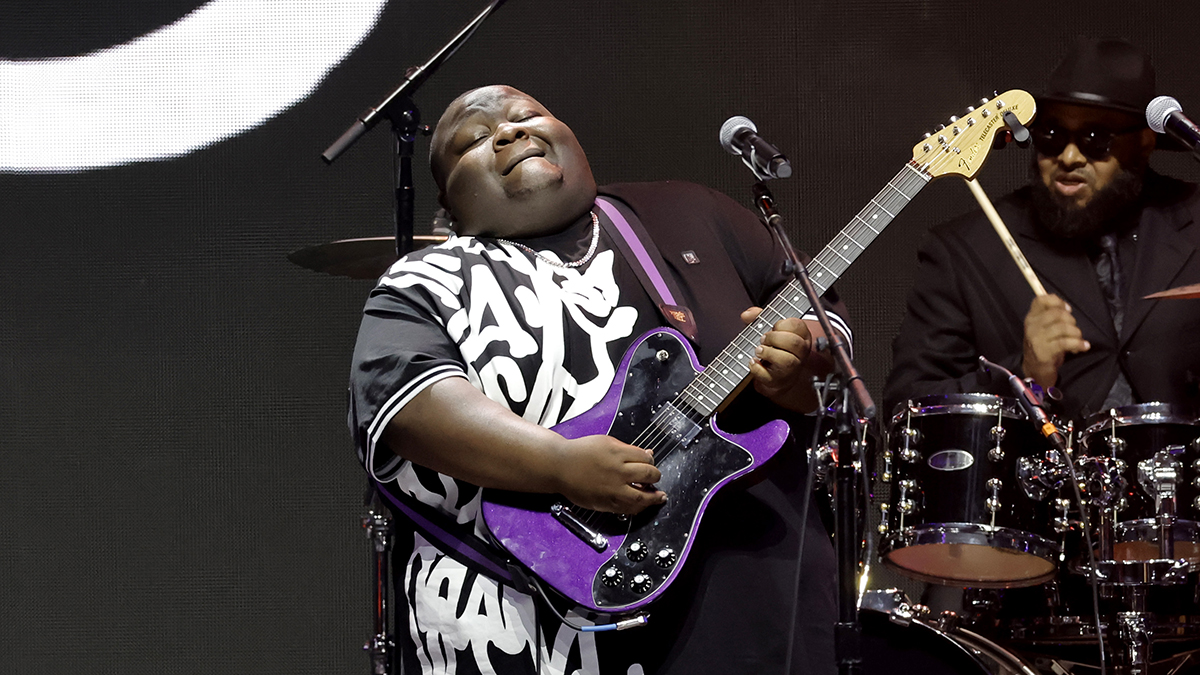“A lot of folk are ignorant. People watch a couple of Stevie Ray Vaughan videos and think all they need is distortion and fast licks”: Christone ‘Kingfish’ Ingram on where guitarists “go wrong” when playing the blues
The blues ambassador reflects on the state of the genre in the modern age

Christone ‘Kingfish’ Ingram isn’t just one of the best blues guitar players – and, indeed, one of the best electric guitar players – currently around, he’s also one of the genre’s best ambassadors.
As the heir to the Delta blues crown, the Fender signature artist has made his name curating a fretboard phrasebook like no other – one that is deeply rooted in an appreciation and understanding of the musical, historical, and cultural provenance of the blues.
It’s this acute awareness of where the blues comes from that separates good blues guitarists from great ones, and, as Kingfish has observed, it’s an awareness that many blues players lack.
Speaking in the new issue of Total Guitar, Kingfish took the opportunity to reflect on the state of blues music in 2023, and noted that many modern blues fans are ignorant to the wider history of the genre.
Indeed, as he eloquently explains, being adept at the blues isn’t just a case of listening to famous players, recreating their tone, and learning their solos – it's also about researching and understanding the genre’s history.
“A lot of folk are ignorant, they don’t understand the true meaning of the blues,” Kingfish noted. “People watch a couple of Stevie Ray Vaughan videos and think all they need is distortion and fast licks!
“But that’s not true,” he continued. “You have to go back and appreciate why this music was made by our forefathers. You have to understand this music was born out of pain and suffering. It wasn’t all about guitar solos or ‘my baby left me!’”
Get The Pick Newsletter
All the latest guitar news, interviews, lessons, reviews, deals and more, direct to your inbox!
That, he says, is the crux of the issue surrounding modern blues: guitarists are quick to learn the tricks of the trade – the licks, riffs, solos, and wider musical workings of the discipline – but neglect to research the history of slavery and racial oppression from which the music itself is derived from.
That’s where a lot of people go wrong – they haven’t tried to find out or understand what the blues is all about
Christone 'Kingfish' Ingram
“That’s where a lot of people go wrong – they haven’t tried to find out or understand what the blues is all about,” Kingfish went on. “It’s cool, whatever, but I feel like people should learn the history before they go into something properly and think they totally ‘get’ it.”
It’s not the first time Kingfish has spoken about the state of the blues world in the modern age. During a conversation with Guitar World back in 2021, the Tele-toting titan argued there was “a lot wrong with the blues genre right now”, and similarly pointed to a lack of cultural understanding surrounding the blues.
“A lot of people don’t think about the history and the significance of the actual culture when it comes to blues. Like, today: we have this lineup. I don’t think we’ve seen an all-Black blues lineup in years, which is kind of sad.
“With the African-American culture being the foundation of the blues genre, that’s sad. A lot of that’s going on, a lot of being a blind eye to the history in the preservation of the blues.”
To read Kingfish's new interview with Total Guitar, head over to Magazines Direct to pick up issue 377, which also contains a breakdown of The Rolling Stones’ greatest-ever riffs.
In other Kingfish news, the guitarist recently put his blues chops on display during Eric Clapton's Crossroads festival, which saw him team up with Eric Gales and Samantha Fish to perform a standard beloved by Jeff Beck.

Matt is the GuitarWorld.com News Editor. He has a Masters in the guitar, a degree in history, and has spent the last 16 years playing everything from blues and jazz to indie and pop. When he’s not combining his passion for writing and music during his day job, Matt records for a number of UK-based bands and songwriters as a session musician.
“Even the thought that Clapton might have seen a few seconds of my video feels surreal. But I’m truly honored”: Eric Clapton names Japanese neo-soul guitarist as one to watch
“You better be ready to prove it’s something you can do”: Giacomo Turra got exposed – but real guitar virtuosos are being wrongly accused of fakery, too









